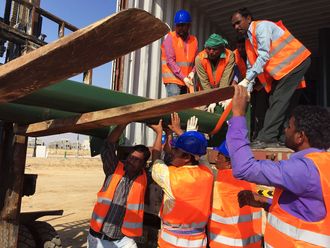
Cairo: Less than two weeks before the arrival of the first groups of overseas Muslims for the upcoming Hajj pilgrimage season, Saudi Arabia has stepped up measures against unlawful pilgrims.
To this end, the Saudi Ministry of Hajj has officially launched a tag to be displayed by legal pilgrims to access holy sites during the Hajj season.
Saudi Minister of Hajj Tawfik Al Rabiah this week launched the Nusuk Card in Indonesia and presented the first batch to the Indonesian Hajj mission.
The Nusuk Card, of which there is also a digital version, contains comprehensive data on each pilgrim, who must carry it to get access to the holy places and move in and around the Saudi city of Mecca.
The card is to be handed over to overseas pilgrims by respective Hajj offices after the issuance of pilgrimage visas while the domestic pilgrims will get it from the service providers after Hajj permits are issued.
The Ministry of Hajj defined the Nusuk Card as an official printed card aimed to tell the legal pilgrim at the holy places from others. Its digital version is available on Saudi apps Nusuk and Tawakklana.
Earlier this month, Saudi Arabia cautioned Muslims planning to perform Hajj pilgrimage of fake campaigns and websites, and defined associated legal channels.
The Ministry of Hajj said reliance on official channels guarantee access to pilgrimage and safeguard pilgrims’ rights during the holy journey.
The ministry stressed that all pilgrims must obtain a Hajj permit through the Nusk platform. The announcement followed a recent statement by the Council of Senior Scholars, Saudi Arabia’s highest Islamic body, who pointed out that performing Hajj without an official permit is deemed sinful.
In February, Saudi Arabia opened e-registration for its citizens and Muslims expatriates, who wish to perform Hajj due this year in June.
Some 1.8 million Muslims from around the world last year performed Hajj, marking the return of their numbers to pre-pandemic levels.
Saudi Arabia has embarked on early preparations for this year’s Hajj under a new strategy for overseas pilgrims. Accordingly, no specific places would be allotted any more for countries. Instead, places for different countries are allocated depending on the time of finalising contracts.
The new mechanism aims at facilitating preparations for Hajj, an obligatory Islamic duty that must be carried out at least once in a lifetime by Muslims who can afford it physically and financially.











